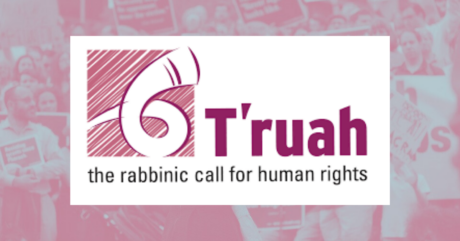Note from T’ruah: The following statement was released by T’ruah in January, 2015, to explain we were launching our campaign to end mass incarceration, which incorporated our existing efforts to end solitary confinement.
Rabbi Shimon ben Gamliel taught: The world stands on three things—on judgment (din), on truth and on peace. (Pirkei Avot 1:18)
In America today, these foundations of our world are at risk. Our criminal justice system fails to do justice, especially for people of color. When cases of brutality involving police officers rarely go to trial, we lose the chance to pursue truth. Peace will only come when we act as though all of communties depend on the safety and dignity of one another.
The Torah insists that even the worst criminal is achicha, your brother. Even those guilty of crimes must be treated as we would want members of our own families treated. But the American criminal justice system too often throws people away–even people not convincted yet of a crime or convicted of a non-violent crime find themselves in inhumane conditions that violate the dignity of a creation b’tzelem elohim.
Tzedek tzedek tirdof—“Justice justice you shall pursue”—the Torah commands (Deut. 16:20). Why does the Torah, usually so sparing in its language, repeat tzedek? Rabbi Simkha Bunim of Pczsha, an early 19thcentury Chasidic master, taught that this means, “Pursue justice justly. The methods we use to pursue justice must also be just.”
In a time when the only options for criminal “justice” are harsh minimum sentences disproportionate to the crime, indeterminate years of solitary confinement for even the youngest of offenders, fatal shootings and choke-holds for carrying toy guns or selling loose cigarettes—all within a system that structurally resists accountability—in such a time, we are a far, far cry from pursuing justice justly.
The Torah further commands, “Veshaftu et ha’am mishpat tzedek” (Deut. 16:18)—“They shall judge the people, judgment with justice.1” Sforno, the 16th century rabbi and commentator, writes that mishpat tzedek, judgment with justice, means impartiality, not treating one case easily and another harshly.
In a society where people of color are treated more harshly by police on the way to incarceration, radically over-represented in prisons during incarceration, or pressured to accept plea-bargains that follow them for the rest of their lives, we are far from a place in which justice is pursued in the fair and balanced way our tradition demands.
Some of us who are Jews of color or who have people of color in our families know too intimately the ways in which people of color are disproportionately affected by our broken criminal justice system. But this broken system does not make any of us safer–not even though of us who experience white privilege. When the police focus on street stops of people of color rather than pursuit of criminals; when people with felony records are barred from public housing, social services, jobs, and other opportunities to rebuilt their lives; and when teens who should be in school waste their youth imprisoned for minor crimes or awaiting trial, none of us benefit.
Our Jewish tradition insists that the goal of punishment is teshuvah, repentance. “Return my backsliding children” (Jeremiah 3:14) means that any criminal who sinned then repented–we accept that person forever.” (Teshuvot HaRitva 159) The American system seeks only to punish; not to inspire teshuvah.
As a Jewish acommunity, we must work in partnership with other communities to create a system based on justice, truth, and peace, and one that works towards teshuvah, not simply punishment.
What should you do today?
This Martin Luther King, Jr., Day, we invite our colleagues to preach and teach about mass incarceration as a crucial part of today’s civil rights campaign. The work T’ruah has done over the last two years on solitary confinement is one piece of the campaign; our support for the #BlackLivesMatter protests and call for greater police accountability is another. In the coming months, we will let you know about other parts of this campaign.
The way of din (harsh judgment) is not the only option. As we read in Midrash B’reshit Rabbah (12:15), in creating the world God contemplated several possibilities: “If I create the world with mercy (rachamim), its sins will be numerous; with judgment (din), how will the world stand? Rather, I will create it with judgment and with mercy, and oh! That the world might stand!”
That “oh!” (halevai) suggests that God is not certain the world will stand on its own. It is constantly in danger of getting unbalanced. Today, it has slipped. It is our sacred moral obligation to rebalance the scales, to return to a world of justice tempered with mercy.
1Translation by Richard Elliot Friedman

